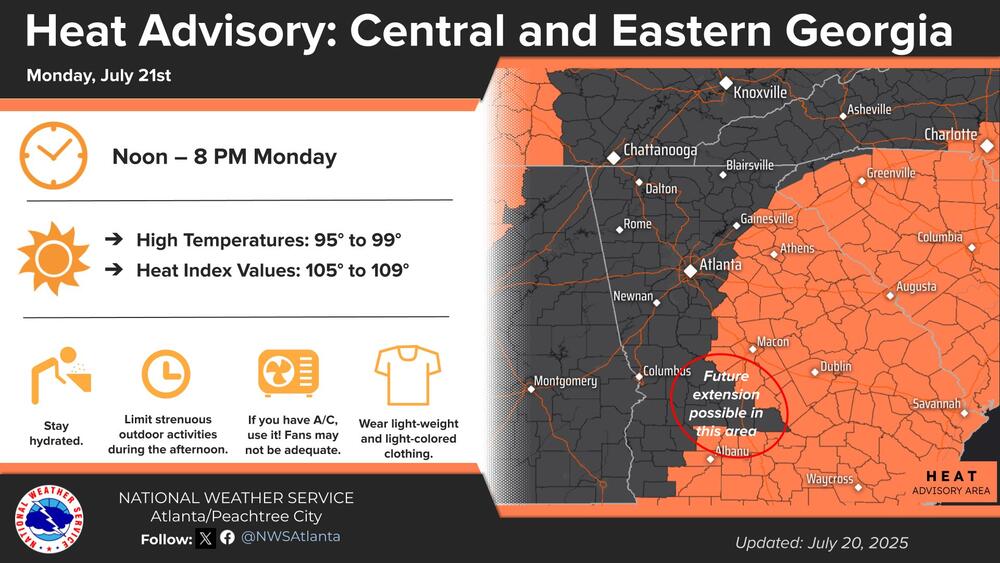
Caption
Forecasts from the National Weather Service for thr week of July 21, 2025.
Credit: National Weather Service

LISTEN: Georgia summers can be blazingly hot — and dangerous to one's health. On days with heat advisories, heat safety is essential. GPB's Sofi Gratas reports.

Forecasts from the National Weather Service for thr week of July 21, 2025.
Georgia summers can be blazingly hot — and dangerous to one's health. On days with heat advisories, heat safety is essential.
The National Weather Service is forecasting heat advisories across the state this week. In South Georgia, the heat index, also known as the "feels-like" temperature, could reach 112 degrees Fahrenheit. Central and eastern Georgia could see a heat index of 109 F.
In Georgia, a heat advisory is issued by the National Weather Service if the heat index is at least 103 F.
Kristin Patten, public information officer with the South Health District in Valdosta, said the agency has been getting the message out about heat safety early.
“A lot of our communities are very used to getting this, and I think a lot of times that can make people a little more complacent,” Patten said. “We remind people, 'Hey, take this seriously,' even on days whenever there's not an extreme heat advisory.”
The National Weather Service will issue an "Extreme Heat Watch" or "Extreme Heat Warning" if conditions are expected to be dangerous enough to require outdoor activities be rescheduled or for people without access to air conditioning to locate cooling shelters.
County Emergency Management Agencies will typically manage local response to extreme heat events. Response will vary depending on the heat risk to different neighborhoods.
Community organizations might offer resources, too.
In Gwinnett County, for example, people who need to take a break from the heat are encouraged to visit Community Resource Centers. The four centers across the county also house public health resources.
Over 50 parks in the county can offer immediate relief, said Regina Miller, deputy department director of Community Services.
“Same exists with that air conditioning, that hydration opportunity, an opportunity to get cool,” she said. “They also offer, obviously, pools, aquatic centers and also the splash pad interactive fountains.”
Since June 1, South Georgia Medical Center in Valdosta has received over a dozen patients with heat-related illness from the local 911 according to a hospital spokesperson.
Georgia’s high humidity makes hot days even more dangerous. That spells trouble for the large number of people working or spending time outside, Patten said.
“Just make sure that you're drinking plenty of water — at least two to four cups of water every hour,” she said.
People without AC should take cold showers or baths, as the National Weather Service says blowing fans may not be enough to keep the body cool.
Meghan Herendeen with the Southwest Health District in Albany said heat exhaustion symptoms include headache, nausea and dizziness. The biggest concern with heat exhaustion is bringing down internal body temperature, care that can be started at home.
Anything worse should be considered an emergency.
“You could still have those symptoms with a heat stroke, but you'll also have the more concerning symptoms as well,” Herendeen said.
Confusion, seizures and slurred speech are possible signs of heat stroke.
Because heat isn’t a transmissible disease, Patten said public health doesn’t consider it an “official reportable illness,” and therefore does not track cases of injury. The data hub for the Georgia Department of Public Health also does not include heat as an “external” cause of death, like it does drowning or homicide.
According to data from the CDC’s National Environmental Public Health Tracking Network, there were 76 deaths from heat and heat-related illness between 2018 and 2022 in Georgia.
Advocates for outdoor laborers have long suggested any count of heat-related deaths are likely an undercount.